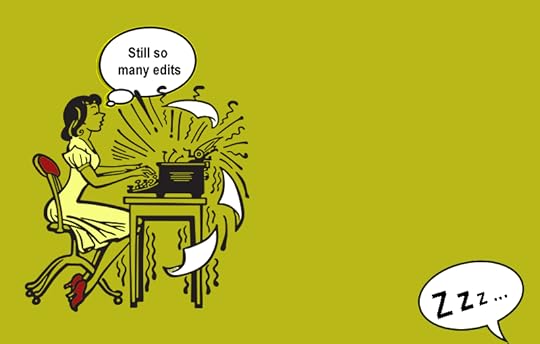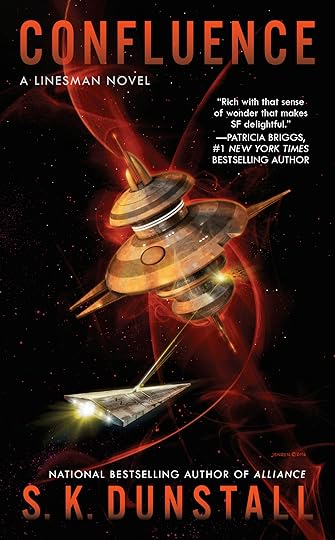S.K. Dunstall's Blog, page 32
June 18, 2016
Winter is here
 It’s not that cold here in Melbourne, but sometimes it feels like it. I can’t recall how many years ago it has snowed in Melbourne. It’s rare that it does, and the snow melts quickly.
It’s not that cold here in Melbourne, but sometimes it feels like it. I can’t recall how many years ago it has snowed in Melbourne. It’s rare that it does, and the snow melts quickly.
We received the copy edits for Confluence on Friday. 3,397 revisions. It sounds bad, but we’re getting better. A good half of those seem to be comma-related. Add commas, remove commas. You’d think we’d know them by now, wouldn’t you? There are a few places we had hyphens where our copy editor took them out, and vice versa. (I nearly put a hyphen in there, but looked it up. It doesn’t need one.)
Around 3,000 of the changes are doubles. For example, add a comma, the whole word gets deleted and a new word with a comma is added. So there are technically under 2,000 changes all up.
Meantime, it’s freezing here in Melbourne. (Freezing for us is getting down to single digits Celsius. Not cold by many people’s standards, but it is by ours.) I confess to staying inside a lot. Reading lots of books.
My long woollen coat has been getting a lot of wear. Last year I wore it around ten days in total.
I’ve been on reading binge, catching up on things I haven’t had time to read while we’ve been writing.
I’ve churned through a lot of series books. Interestingly, I have notice that I have no trouble reading books one and two in a series, but the series has to really grab my attention for me to pick up book three.
(Chews fingernails, for Confluence is book three.)
I have friends who don’t like to read a series until the series is finished because they want to read them all at the same time. Yet, if I have to wait for a third book, with the break in between, I think I’m more likely to read it.
Or maybe we should just write duologies in future. 
June 11, 2016
Naming your book
One of the more obscure movies Alan Rickman was in was a movie called Blow Dry. Not just Alan Rickman, either. It had Josh Hartnett, Natasha Richardson, Bill Nighy, Rachel Griffiths, Warren Clark and others.
It was a nice little comedy about a hairdressing competition. Funny in parts, moving in others. I still stop and watch it every time it comes up on the television.
I almost didn’t watch it at all because of the title. I mean. Blow Dry. What sort of movie does a name like Blow Dry evoke? Not one that I want to see.
Names are important.
Before we sold Linesman we’d heard so much about how writers had no control over the name the publisher chose for your book. Linesman was the working title, and it stayed the title all the way through. I don’t even remember anyone suggesting anything different.
The working title for Alliance was Kari Wang. We couldn’t think if anything that suited it, and by now we knew we wanted one-word titles for all the Linesman series books. I can’t recall now if we sent it away with that name, or if we changed it just before we sent it away to Linesman#2. We were asked if we had any ideas for names. We suggested a few, but it was someone at the publishing house who suggested Alliance.
The working title for Confluence was also named for the secondary point-of-view character. Again the publishing house asked for some suggested names. We supplied a list of six. One of those was Confluence.
Right now, we’re thinking about names for the next book we are working on. I’m not even going to name the working title, because it (and I quote)
Sounds too much like a women’s fiction novel about hairdressers and manicurists set in the 1950s.
Maybe that’s what made me think of Blow Dry in the first place.
June 7, 2016
Book news
This is just a quick update. We haven’t given a progress report for a while.
Alliance, book two of the Linesman series, has been out in the wild since late February. It’s been well received so far
Linesman has gone back for reprints, which is nice
Confluence, book three of the Linesman series, has been accepted for publication*. We’re expecting copy edits back in a month
We got the final artwork for Confluence early last month, so we’ve been spreading the cover picture around a bit
This means we’ve finished the trilogy we were contracted to do. We don’t know what happens next. That’s with our agent.
Until that decision we’re happily writing a new story about [can’t tell, spoilers]. It’s space opera. Lots of action. A little bit of fun [we hope]. Characters we love.
We’ll see.
* You get three payments for a book. The first is on signing, the last is on publication, and the middle one is what they call delivery and acceptance. This means your editor has finished with any edits she wants for the book and deems it ready to pass on for publication. There’s another round of edits after that, copy edits, where the copy editor checks spelling and grammar, and whether what you wrote works in with the earlier books.
June 5, 2016
It’s all relative to your frame of reference
You’re sitting on the train, listening to the phone conversation of the girl next to you. (You’re not trying to listen, but it’s that level where you can’t tune it out, and you don’t have a pair of noise cancelling headphones with you. In fact, half the carriage is listening for that very same reason.)
She’s having boyfriend trouble.
“I think he wants to drop me. It’s our anniversary in three weeks. I found this lovely restaurant. But he says he can’t afford it. It’s an excuse. He doesn’t want to go out.”
Noises from the other end of the phone.
“No. He’s like that all the time. And it’s not as if he can’t afford it. We’re going to this expensive steakhouse tonight.”
More noises from the other end of the phone.
“He knows I’m vegetarian. He’s apologetic and all that, but it’s his father’s fiftieth birthday and his dad likes steak. So we’re going to this place tonight—fifty dollars a steak, where I can’t eat anything—and then he says he can’t afford to take us anywhere nice on our anniversary.”
A short reply from the other end of the phone.
“No. It’s just an excuse. He’s looking for an excuse to make me drop him. He’s too cowardly to do it himself.”
You want to lean over and say to her, “Maybe he really can’t afford it.” Half the train probably does too. But this girl wouldn’t believe you, because she’s convinced the boyfriend is looking for an excuse to drop her.
She’s an unreliable narrator, as far as her boyfriend is concerned, because she’s interpreting everything he says and does in a specific way, which is not necessarily how most people would see it. And because she’s interpreting it that way, you, the reader—or in this case the listener—get a very specific idea about this girl and her boyfriend.
What impression do you have of the boyfriend?
He gets on well with his family. He’s careful with his money, although he is prepared to overspend for an occasion. The occasion he’s prepared to overspend for is his father’s birthday, not his girlfriend. So, not sure yet about the relationship with the girlfriend. Maybe she is right that he wants out. Even so, he comes across as a nice, family-oriented guy.
The girlfriend?
She comes across as somewhat selfish, thinking more about herself than her guy. Thoughtless about finance. Unappreciative of a man who puts family first. Whether she’s correct or not about the boyfriend trying to get her to dump him? Don’t know. Don’t suspect so, but that is more a gut reaction to the character than a reasoned is he or isn’t he.
This is a great writing technique. Using a scene/conversation to convey something else entirely. It gives extra layers to your story, making it richer.
In another example, take the film-clip, above. Mr Bean and the two-way mirror. How you perceive this scene totally depends on whose point-of-view you are watching.
As they say in science, it’s all relative to your frame of reference.
May 28, 2016
Maybe I should read more widely
Our niece is in hospital.
“We’ll bring you some books,” we said. “What do you like to read.”
“I don’t like fiction. I like real stuff. True life. Things that can happen. Chopper Read. That was good. And I read another one about a woman who had to escape from her abusive husband.”
“I’m close to a bookshop,” I told Sherylyn. I’ll get the books on the way.”
I confess, we love our fiction. Neither of us read a lot of true life. Sherylyn reads more than me, but given a choice between a novel and a true-life story, we’ll take the novel every time.
But everyone has different tastes, and most of all I wanted to give something that our niece would enjoy. I thought it would be easy. I’d just walk into the bookshop, find the true life stories, pick up three or four, and be out in ten minutes.
It wasn’t like that at all.
There were so many stories about criminals and serial killers. I know she liked Chopper, but I still found it difficult to buy books about serial killers. There were a lot of books about people who’d overcome illness of some kind. While she may have liked them, I wasn’t sure. She was in hospital, after all. It’s a bit like going to see someone who’s sick and saying, “Well, here’s some stories about sick people to make you feel even worse.” So that limited things somewhat.
Worse, I found I couldn’t just pick up books and hope she’d like them. They had to books that I would pick up and read myself.
I spent two hours in the bookshop, and came out with three books. One about a woman who opened an orphanage in Vietnam, one about a man who had been adopted out as a young boy, then years later follows up on his birth parents and discovers his father is a notorious killer. And the third one was about a bikie who travelled.
I don’t know what our niece will think of them. But I like to think that even if she doesn’t like them, and leaves them at the hospital for someone else to read, someone else might enjoy them. 
May 21, 2016
Working hard on Confluence edits
 Well, Sherylyn is, anyway.
Well, Sherylyn is, anyway.Our editor sent back further edits for Confluence. They’re due on Monday.
Around this time in the editing process Sherylyn does most of the work. I get to relax (mostly), and every so often follow along to see what the edits are and whether I agree with them.
“Yes, yes, yes, yes. Sure. That sounds good. Hmmm. Not sure about this one. I’m going to change it. Are you okay with this change? Yes, yes, yes, yes.”
The book is off to the copy editor on Monday.
We’re far enough removed from Confluence now to see some things we’d like to improve, but we don’t have the time. I think every writer does that, can’t let the story go. What is the definition of done?
This final tidy up has cleaned the book up nicely, though. It’s good.
Last night over dinner we had a long chat about what we learned writing these three books, what we’d do again, and what we’d do differently next time.
I might put it into a blog one day.
May 14, 2016
It’s Eurovision again … already
This year has gone so fast. it’s May already, and that means Eurovision time.
Like many Australians, we have watched the Eurovision for many years. Back then we took the British telecast and Terry Wogan’s droll comments were part of the entertainment. (Not sure he’d be allowed to comment that way any more, and I think that’s a good thing.)
So Australia has a long history of watching the Eurovision, but how on earth we ever got to compete … it is the ‘Euro’ vision.
I have no idea what we would do if we won.
Still, I like the Australian song entry. It’s one of my favourites. But then, I’m a sucker for a power ballad.
May 11, 2016
Cover reveal – Confluence
Our editor sent us the cover for Confluence a few days ago, but we haven’t been able to reveal it until now.
Look!
 The cover for Confluence. Linesman book three. The book is coming in November.
The cover for Confluence. Linesman book three. The book is coming in November.Isn’t it awesome.
The artist is Bruce Jensen, who did the first two covers. What a trifecta.
May 7, 2016
Tell me more about the lines
 Some technical detail about lines
Some technical detail about lines
The other day a workmate who has read Linesman and Alliance asked me, “How do the lines eat?”.
I don’t think fast sometimes. “I don’t know,” I said.
But the fact is, we do know. Sort of. We don’t know right down to the specific detail, but we know roughly what makes the lines tick.
Here’s my attempt to explain it out loud
First up, lines don’t eat as such. They are bands of energy and will take on energy to strengthen their own bands. If you like, you can think of it as adding electricity to a battery, but a better analogy would be amplifying a wave in phase so that the strength of the wave increases.
The extra energy comes mostly from the void. There’s a reason for that, but since we haven’t mentioned that reason in the books yet, I can’t say why.
When the lines aren’t going through the void they can supplement with energy from the Bose engines. Humans think the Bose engines are only required to get them through the void. They’re not. They’re also needed for line health. The engines on the alien line ships provide this energy much better than the human-built Bose engines do, so the lines on a healthy alien ships will always be stronger than those on an equivalent human ship.
But what about sentience?
The sentience of the ship is symbiosis. A line ship’s sentience depends on the people travelling with them, and the emotional strength of their interaction with each other. The lines need sentience around them to become aware.
Awareness comes from interaction with other sentience. The more a ship is around other intelligent beings who interact with it the more aware it becomes.
Note the emphasis here. Human line ships are sentient, but interaction is often one way. Humans don’t think of their ships as sentient (or they never used to, not unil Ean came along), so they didn’t interact with it.
Except the captains, who bond to their ship. In a way they become an extension of the lines and the lines extend them. That’s why ships always sound like the captain.
Repairing the lines
We haven’t touched on repairing the lines. That’s a subject for another blog.
April 30, 2016
Living history
Anzac day
April 25 is Anzac day here in Australia (and in New Zealand). It commemorates servicemen and women killed in war, and honours those who returned.
It’s a big day here, with many thousands getting early up to attend the dawn service.
Nowadays, it’s big, but as a child I remember thinking Anzac day would be a non-event in my lifetime. Back then only the returned servicemen of the two world wars marched, and they got less every year.
What changed?
Two things. One, families started marching with their returned servicemen. Just as importantly, veterans from the later wars, like Vietnam, finally started to march as well.
History has turned about-face in my lifetime
Many of the soldiers who fought in the Vietnam were conscripted. They had two choices. Join the army and fight, or go to jail.
Back when I was a child the people who chose to go to jail were the heroes. Those who actually went to Vietnam and fought were pariahs. When they came home many of them were vilified as murderers.
Yet nowadays, it’s the exact opposite. If you fought in the war you’re a hero, and if you dodged the draft (by going to jail) you’re a pariah.
Our version of history changes according to the times we live in
Our version of history changes according to the times we live.
The Australian involvement in the war lasted from 1962 to 1975. According to Australian Government Vietnam war website:
Vietnam … lasted far longer than previous wars in which Australians had fought and it occurred at a time when societal changes, some brought about by the war, meant that attitudes at the beginning of the war were very different to those at the end. Many of the myths that have arisen about the war are partially attributable to this. Generalisations about one part of the conflict – and the dissent that arose in its final years is one example – do not necessarily apply to another.
My memories of the war are totally about the later years. I remember the dissent. I remember the vilification. I remember the hostility around the veterans. Although, according to the same website:
Associated with misunderstandings about the extent and longevity of opposition to the war is a widespread view that those who had served in Vietnam were denied recognition when they returned to Australia and that many veterans of the conflict were treated with hostility by the public … myths and misunderstandings about Vietnam abound … Acts of hostility against returned soldiers were not isolated, but they were not universal.
It also changes according to your own experience
The Vietnam war website gives what is probably a balanced overview of the conflict and the treatment of returned veterans. It wasn’t my experience so no matter how balanced the site is, I’m biased. It feels like a whitewash.
It’s a bit like the parable of the blind men touching the elephant. Each one feels a different part. The one who feels the ear says the elephant is like a fan, the one who feels the tusk says it is like a solid pipe, and so on.
My experience of the Vietnam war, as a child watching, is totally different to that of an actual veteran, and each veteran will have his own memories, depending on where he was, when he was deployed and how he was received when he came home.
It’s living history
Memories are memories. They fade over time. Some parts of a memory become more important, other parts fade away.
It’s interesting, watching how changes in attitude and a little bit of time alter our historical interpretation of events.
Even in a single lifetime.






